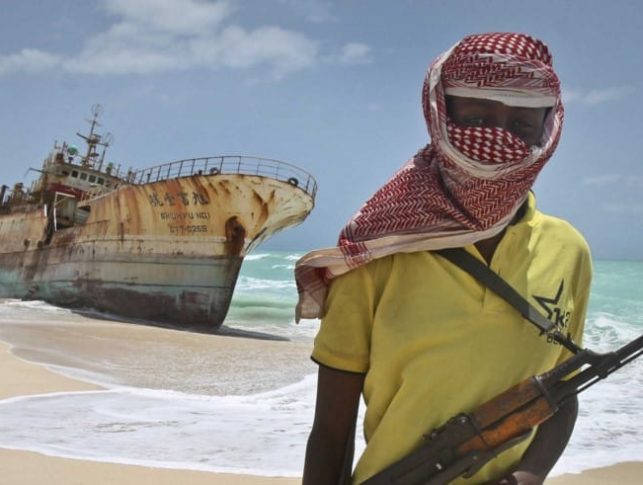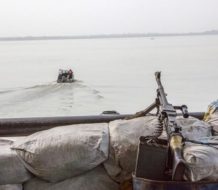A captured pirate was brought before Alexander the Great. “How dare you pillage the sea?” asked Alexander. “How dare you pillage the whole world?” the pirate replied, and continued: “Because I do it with only one ship, I am called a ‘thief,’ you, doing it with hundreds of ships, are called an ‘emperor.”– Noam Chomsky
In the early 1990s, commercial foreign fishing vessels and trawlers began working off the Somali shore, invading sovereign waters and exclusive economic zones. Not only did they displace local fishermen, but the illegal over-fishing by these foreign companies severely depleted the fish stock and greatly reduced the long-term health of Somalia’s fisheries through over-exploitation. Greedy international fishing companies with illegal fishing technologies, in an eventual case of reverse irony, “pirated” Somali fishing stocks for illegal profit. Estimates place the foreign fishing poaching at $300 million USD every year, an astronomical sum considering that this occurred for over a decade. Put in scale, if only one year’s worth of the illegal poaching was returned to Somalia, the GDP would rise by over 5%. While poachers were moving in from Europe and Asia, European ships also went to Somali waters to illegally dump toxic industrial waste, another major violation of international law. The UN Environmental Program reports that the nuclear waste dumped on territorial shorelines caused sickness and disease in Somali coastal cities, and killed off the little fish that were left. These disenfranchised fishermen, left only with their boats and nautical expertise in the Gulf of Aden, would soon become the notorious pirates of Somalia.
The pirate economy is a considerable source of employment and income
For Somalis who live in coastal communities, the pirate economy is a considerable source of employment and income: there is a need for crews directly involved in the hijackings, and a local ground crew to guard captured moored ships. Among this exercise are entire administrative, legal, and financial teams, a network of financiers and shareholders, and guards to police the territory in which the pirates reside.
Interviews with former pirates suggest that typical crew men make between $30,000-$75,000 USD per haul, with a $10,000 bonus for the first man to board the ship, as well as bonuses for other displays of initiative. This is an astounding sum considering that the 2012 GDP per capita in Somalia was $128 in current USD. Pirates also face heavy fines for bad behavior, such as non-consensual sex or mistreating other crew members, which carries a $5000 fine and dismissal.
Between 2004 and the first quarter of 2009, Somali piracy rose from 3% to 60% of the global total of piracy attacks, with revenue growth almost quadrupling from 2008 to 2009. Somalia, like other states where piracy occurs, lacks the capacity to patrol its waters; thus Somali pirates have equal advantage to other pirates in terms of access to un-patrolled coastlines, and yet Somali pirates remain disproportionately successful on a global scale.
Attacks reported as far as 600 nautical miles from Mogadishu
And uniquely, these huge gains are not made in Somalia’s territorial waters, but in international territory, with some attacks reported as far as 600 nautical miles from Mogadishu, where the presence of armed guards, unregulated security measures, and international navies act as a powerful and permanent deterrent to pirates from other countries. This unique capacity demonstrates that the assumption that piracy simply exists due to weak statehood in protecting territorial waters does not fully explain the pervasiveness and huge growth experienced by the Somali pirate enterprise.
Somali pirates view themselves as the protectors of their territorial waters, with group names like “National Volunteer Coastguard of Somalia,” arguing that their ransoms are taxes levied in absentia of their defunct government. At the same time, supporting the ransom system and their Robin Hood enterprise is not a sustainable solution either: Somali pirates’ astounding capacity for growth and entrepreneurship suggest that increased revenues will result in better arms and equipment, increasing the likelihood of further attacks.
As ransom demands continue to rise, by the time Somali piracy becomes unaffordable the power of the pirate enterprise will be impossible to contain, let alone eliminate. This burden will be borne by the shareholders, crew members, and global consumers who depend on the 90% of world trade which is now moved by ocean. The problem must not be approached from the outside through militant suppression, or through the path of least resistance in paying a ransom. The situation demands a new and creative approach; using power structures that exist locally in pirate and traditional systems to build a government that meets the needs of both the local and international community from the ground-up.
Not a realistic solution for Somalis
Somali people do not identify themselves through a sense of nationhood, but a sense of kin, an indigenous six-thousand-year-old framework of social organization that was forged by the harsh terrain and nomadic lifestyle demanded by the barren Horn of Africa. As kinship emerged as the most effective form of social ordering in this environment, the clan acted as the largest unit of political organization, and legal and political institutions sprang from this system. The 400-year-old history of peaceful cohabitation among these clan polities demonstrates the efficacy of this form of governance. The centrally bureaucratic and non-personal structure of the state system is the polar opposite of the political realities and imagination of self in Somalia. The model of the nation-state, and forcing these clans together though imported institutions will never be realistic solution for Somalis.
Is self-governance possible?
The presence of pirates and other autonomous regions in Somalia signifies that there has been a shift in the modern political conception of authority and sovereignty: why is local authority less legitimate than authority granted by the international community?
Though mainstream political discourse assumes that self-governance could never facilitate order between members of different social groups, the relative stability piracy offers provides support for cooperative relationships between clans. Despite ubiquitous potential for conflict, pirates rarely fight, steal, or deceive each other. In Somalia, cooperation has always been essential for survival- especially today.
The pirate’s appropriation of the clan-system of leadership demonstrates that to some degree, state-building is possible in Somalia as long as people work with the way authority is recognized in the Somali imagination. Somalia’s history of fourteen failed foreign interventions demonstrates that traditional Western state structures are imperfect and do not comply with indigenous customs and institutions. However, the continued attempts to establish a centralized polity demonstrates that central governance is the type of entity the West is most comfortable dealing with.
Somalia isn’t a state
Current political thinking assumes that Somalia is a failed state; therefore the logic infers that at one point Somalia was a state, which it never was- in reality, “Somalia” as a nation exists purely as fantasy and is perhaps one of the greatest untruths ever sold.
And if piracy is due to failed statehood, then the automatic conclusion is that the solution to piracy is statehood. This logical framework is at the heart of foreign policy towards Somalia and characterizes the nature of every intervention that has occurred. However, UN satellite maps of pirate activity indicate no clear relationship between political stability in post-state Somalia and the emergence of piracy. The presence of pirates in Somalia demonstrates that the failure does not lie in the condition of a failed state, but instead the imagination of failed statehood itself.
These repeated representations of the ‘failed state’ work to legitimize the concept, despite the inherent limitations and flawed assumptions that obscure its utility. And at the heart of this is Western universalism, as the construction of the failed state dichotomy finds its foundation on the West’s fixed standard of what they perceive to be a successful state: democratic, centralized, and transparent. It is at its core an imposition of political ideologies put forth through the humanitarian pretensions of the failed state rhetoric. Until this is understood, the international community’s disregard that alternative models of governance can succeed will continue to impede our larger goals of world peace and stability.



